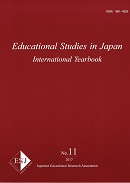Volume 14
Displaying 1-13 of 13 articles from this issue
- |<
- <
- 1
- >
- >|
Special Issue: Education and Politics in a Global Age
Editorial Preface
-
2020Volume 14 Pages 1-3
Published: 2020
Released on J-STAGE: July 10, 2020
Download PDF (179K)
Articles
-
2020Volume 14 Pages 5-14
Published: 2020
Released on J-STAGE: July 10, 2020
Download PDF (223K) -
2020Volume 14 Pages 15-27
Published: 2020
Released on J-STAGE: July 05, 2011
Download PDF (268K) -
2020Volume 14 Pages 29-38
Published: 2020
Released on J-STAGE: July 10, 2020
Download PDF (232K) -
2020Volume 14 Pages 39-51
Published: 2020
Released on J-STAGE: July 10, 2020
Download PDF (224K) -
2020Volume 14 Pages 53-68
Published: 2020
Released on J-STAGE: July 10, 2020
Download PDF (271K)
Translated Articles
-
2020Volume 14 Pages 69-84
Published: 2020
Released on J-STAGE: July 10, 2020
Download PDF (201K) -
2020Volume 14 Pages 85-91
Published: 2020
Released on J-STAGE: July 10, 2020
Download PDF (161K)
Review Article
-
2020Volume 14 Pages 93-95
Published: 2020
Released on J-STAGE: July 10, 2020
Download PDF (152K) -
2020Volume 14 Pages 97-99
Published: 2020
Released on J-STAGE: July 10, 2020
Download PDF (173K) -
2020Volume 14 Pages 101-103
Published: 2020
Released on J-STAGE: July 10, 2020
Download PDF (159K) -
2020Volume 14 Pages 105-107
Published: 2020
Released on J-STAGE: July 10, 2020
Download PDF (153K) -
2020Volume 14 Pages 109-111
Published: 2020
Released on J-STAGE: July 10, 2020
Download PDF (152K)
- |<
- <
- 1
- >
- >|
